The Election Commission told to be transparent
By RN Bhaskar
Picture generated using https://deepai.org/machine-learning-model/text2img
This article is being written on 15 August 2025. It is celebrated as Independence Day in India. And nothing could be more pleasing for Indians than to find the morning newspapers reporting on the pronouncement of the Supreme Court on the role that India’s Election Commission has ought to play (https://www.business-standard.com/india-news/sc-asks-eci-to-detail-docs-considered-in-2003-bihar-electoral-roll-) .
The Election Commission is a constitutional authority. It is meant to be fair and transparent. But recent developments suggest that it has been anything but that. As these columns pointed just a couple of weeks ago, there are three questions to which the Election Commission ought to provide answers (free subscription — https://bhaskarr.substack.com/p/three-questions-for-indias-election). The three questions are:
-
- The country was aware of bogus Aadhaar cards, and that dead people still had valid Aadhaar cards and voting cards. Yet the Election Commission went ahead with the decision to hold national elections in 2024. Why?
- The Election Commission knew that the only way to weed out unregistered deaths and bogus Aadhaar cards was through the holding of the National Census that was meant to be held in 2021. Why didn’t the Election Commission forbid elections till the Census was held first?
- Why did the Election Commission choose to begin selective weeding out of names from the voters list in Bihar without being transparent about it? Why not order the cleansing of the complete list for the whole country first? The Commission did this under an unprecedented “SIR” or the Special Intensive Revision initiative. It was launched by both the Election Commission and the Registrar General of India in charge of births and deaths. Just six months earlier, the Commission had recommended the linking of Aadhaar and Election cards!
The matter got compounded when The Congress Party (the leading opposition party in the country, held a press conference in Bengaluru to demonstrate (a) that dead people had been allowed to vote; (b) that multiple votes had been cast by the same person in different centres; (c) that the Election Commission had provided the voting list for public scrutiny in such a manner that the letters were not recognisable through the OCR route. Effectively, the Commission had permitted fraud. It had even made even the provision of electoral rolls non-transparent. The conference now has the potential of snowballing into a national movement (https://www.youtube.com/watch?v=Xue41_-91_o&t=1s).
The developments disclosed in the conference in Bengaluru – which showed how the Commission had prepared lists that could not be digitally recognised could have weighted on the minds of the Supreme Court judges. They therefore ordered that digital lists of all the names that had been cancelled be put up of the Commission’s website (https://www.livelaw.in/top-stories/publish-on-website-list-of-voters-omitted-in-bihar-sir-with-reasons-specify-aadhaar-card-can-be-submitted-supreme-court-directs-eci-300910). The Commission was also asked to include Aadhaar as one of the documents that could be used by candidates. Clearly, when the Commission had allowed them for the 2024 elections, why the whimsical move to ban them only for the Bihar elections?
In fact, there are other reasons to believe that the Election Commission had begun to make decisions that were injurious to the concept of democracy. It was becoming obvious that the Commission had begun to believe that it was answerable to nobody.
There was also the issue where the Election Commission had asked the government in March 2025 to allow for the linking of Aadhaar cards with Election cards (https://bhaskarr.substack.com/p/linking-aadhaar-and-voter-ids-ushering). If Aadhaar cards were okay in March 2025, why not in Bihar in August 2025?
Fears about the Commission becoming imperious and disdainful of pleas made by responsible citizens is also evident from the recent letter that EAS Sarma, former Secretary to the Government of India. The letter, reproduced in full below has been sourced from https://countercurrents.org/2025/08/wake-up-election-commission-to-the-harsh-reality-of-fraudulent-additions-to-voters-lists-and-toxic-exclusions/
The letter shows how, despite several requests, the Commission had not bothered to address the grievances pointed out.
Reproduced letter:
To
Shri Gyanesh Kumar
Chief Election Commissioner
Dr Sukhbir Singh Sandhu
Election Commissioner
Dr Vivek Joshi
Election Commissioner
Dear S/Shri Gyanesh Kumar, Sandhu and Joshi,
I write this in continuation of my letter of August 8, 2025 . I find that the Commission, instead of introspecting on complaints from the public, has chosen to shoot the messenger, which does not augur well for eliciting public trust in its impartiality and objectivity.
I find a more recent report (https://www.reporters-collective.in/trc/5-000-dubious-voters-from-up-make-it-to-bihar-constituency) that refers to serious errors in the draft electoral rolls of Bihar, which the Commission is presently trying to finalise.
I have extracted below some distressing paragraphs of the above news report below:
“We found more than 1,000 voters from Uttar Pradesh to be illegally listed as voters on the new list of Bihar’s Valmikinagar constituency, with exactly the same details recorded in both state lists. Additionally, we have found thousands more who are listed on the new Bihar electoral list and in UP with minor alterations in their details. These add up to more than 5,000 dubious, bogus, or double voters. We detected that all of them hold two different Electoral Photo Identity Card (EPIC) numbers in the two states. This is illegal and leads to fake or wrongful votes. It is illegal for a legitimate voter of the country to hold two EPIC numbers. ECI is required to generate and provide a unique EPIC number to each legitimate voter only after scrutiny of their records. For more than 1,000 cases, we found perfect matches: Names of the voter, their ages, and their listed relatives (a mandatory field in the ECI database) were exactly the same across the databases of the two states. Only, their addresses were different.
In thousands of other cases, the voter’s name or that of the relatives had been changed by altering 1-3 letters in the spelling. In some cases, ages had been altered by 1-4 years across the two databases and the rest of the credentials matched.
These are results of an investigation carried out by The Reporters’ Collective with the help of data analysts to check the integrity of the new Bihar draft voter list. We started with Valmikinagar, one of Bihar’s 243 assembly constituencies that are scheduled to go for elections later this year in October-November………………..They converted the scanned copies to data that can be read for each character in the specific Hindi font that the ECI uses”
I would not be surprised if the Commission responds as usual and questions the credentials of the analysts, instead of examining the authenticity of their findings, to divert attention from the shortcomings in the Bihar SIR.
As a Chinese proverb says, “It doesn’t matter if a cat is black or yellow, as long as it catches mice.”
Irrespective of whose analysis it is, the Commission should ponder over the findings from that analysis.
In these days of electronic databases and easy diagnostic tools, I am surprised that the Commission, instead of promoting transparency, public accountability and integrity of the processes involved in the preparation of electoral rolls, should give an impression to the public that it is hiding something.
Why should the Commission provide only scanned versions, instead of digital ones to judicial institutions, political parties, and the public at large? Is it to prevent the public from electronically verifying them for duplicate voter entries etc.?
Why should the Commission amend Rule 93 of the Conduct of Election Rules, 1961 to exclude public access to important election papers including video recordings of the poll process
(https://timesofindia.indiatimes.com/india/government-amends-election-rules-to-restrict-public-access-to-cctv-other-electronic-poll-documents/articleshow/116535627.cms)? Is it for keeping the public in the dark about the polling processes?
Is the Commission afraid of transparency? Is it afraid of public accountability?
The above investigation refers only to serious errors, deliberate or otherwise, in one Bihar constituency. If a similar analysis is to be done for other constituencies, many more skeletons may tumble out, rendering the so-called “Special Intensive Revision (SIR)” dubious.
Both fake additions to Electoral Rolls and fraudulent exclusions imply a serious danger to the integrity of Bihar elections.
Wake up, Election Commission. You may shoot one messenger; you may shoot two; but you cannot smother the sentiments of more than a billion people.
If the Commission has any sense of public accountability, it should suo moto carry out an inhouse cross-verification of the ongoing Bihar SIR, place its findings in the public domain and be prepared to answer questions from the public. Failing that, you will end up making a mockery of conducting elections.
I hope that the Commission starts taking such analytical reports seriously and stops treating complainants as adversaries, enemies of the nation!
I hope the Commission rises above politics and conducts its affairs as an impartial apolitical authority, as it should in terms of Article 324 of the Constitution.
I hope the Commission acts on behalf of more than nine million voters of our great nation. I hope the Commission acts in support of the democratic values of our Constitution.
Yours sincerely,
E A S Sarma
Former Secretary to the Government of India
Visakhapatnam
=================
Clearly, the Commission has a lot of explaining to do. It must explain:
- Why queries from responsible persons were blithely ignored?
- Why serious issues were not even redressed?
- Why information was being given out in a manner that would frustrate normal attempts to examine the veracity of electoral rolls?
- Why rules were introduced, and then jettisoned in a capricious manner”?
- Why it had ignored its principal responsibility – of ensuring that elections were held in a fair and transparent manner.
In conclusion
One hopes that the directions of the apex court will prod the Election Commission to become more responsible in carrying out the work assigned to it. The Commission needs to be reminded that without free and fair elections held transparently, democracy ceases to have any meaning at all. It is better to stuff ballot boxes instead. It could save the country the expense and the heartburn. But then, as the Commission should realise, that would be patently unconstitutional.
=======
Do view my latest podcast on Making cities walkable. You can view it at https://youtu.be/Rjb0G8rWibU
———————–
And do watch our daily “News Behind the News” podcasts, streamed ‘live’ every morning, Monday through Friday, at 8:15 am IST. The latest can be found at https://www.youtube.com/live/lpFz1LN6mTQ?si=EyPpQTDNYPT4eoiS
=============


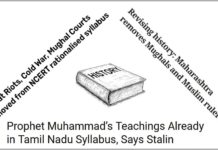


























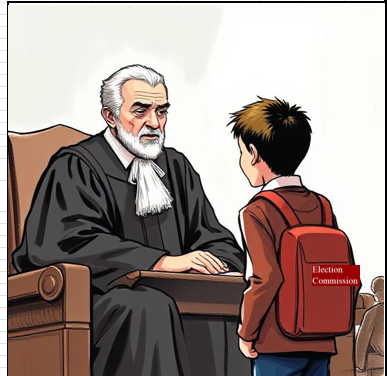

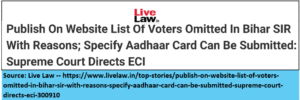
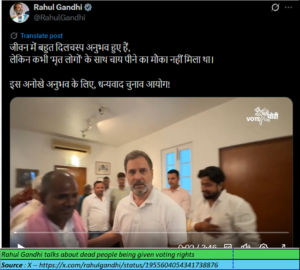
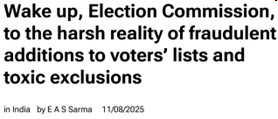
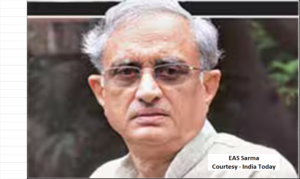







COMMENTS